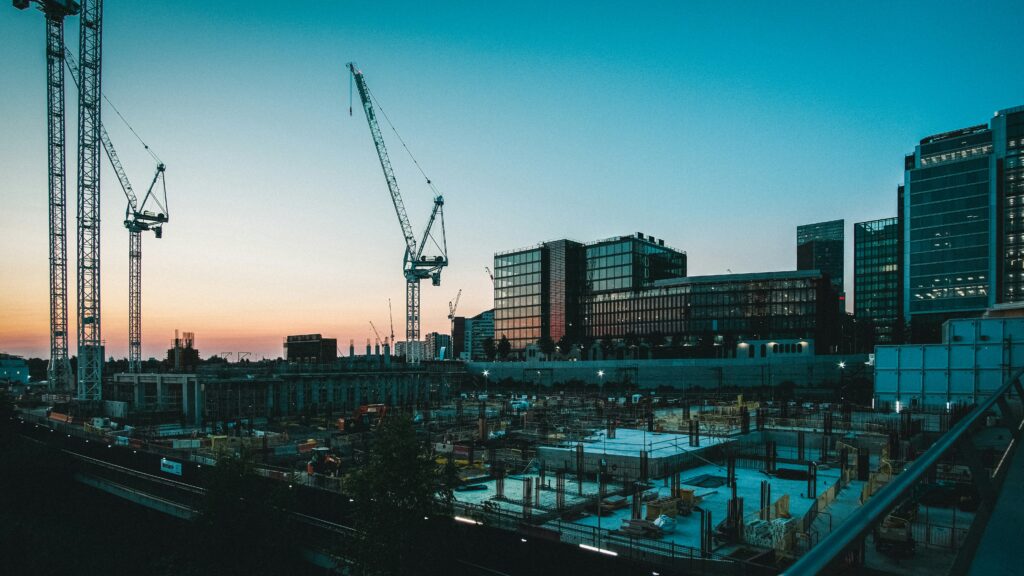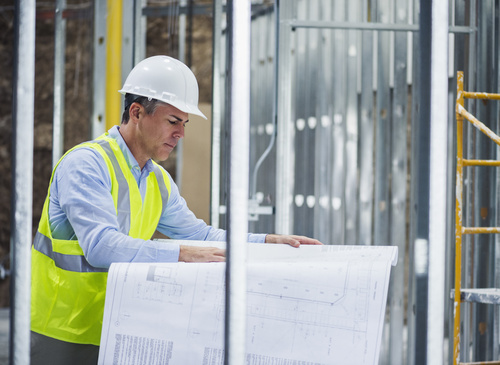US Commercial Construction: Challenges and Opportunities
Posted on Saturday, November 18th, 2023 at 1:01 pm

Photo by Samuel Regan-Asante on Unsplash
The US commercial construction industry is a vital part of the economy, responsible for building and maintaining the infrastructure and buildings that businesses and organizations of all sizes rely on. In 2022, the industry generated over $1.6 trillion in revenue and employed over 7 million people.
However, the commercial construction industry faces a number of challenges, including labor shortages, supply chain disruptions, and rising material costs. Despite these challenges, the industry is expected to grow substantially in the coming years, driven by demand for new and renovated office buildings, shopping malls, healthcare facilities, and other commercial spaces.
Challenges
Labor Shortages
The number one challenge facing the construction industry is a shortage of experienced talent. The industry has been struggling to attract and retain workers for years, and the problem is expected to worsen in the coming years as the workforce ages and more baby boomers retire.
The labor shortage is being driven by a number of factors, including:
A skills gap: The construction industry requires a wide range of skills, from carpentry and plumbing to electrical work and project management. However, many young people are not pursuing careers in the trades, and many existing workers are retiring.
A competitive job market: Construction workers are in high demand across many industries, including manufacturing, energy, and transportation. This makes it difficult for construction companies to attract and retain workers, especially in certain regions.
A negative perception of the industry: The construction industry is often seen as being physically demanding and dangerous, with long hours and low pay. This can make it difficult to attract new workers, especially younger people.
Supply Chain Disruptions
Another major challenge facing the commercial construction industry is supply chain disruptions. The COVID-19 pandemic, the war in Ukraine, and other factors have caused widespread disruptions to the global supply chain, making it difficult and expensive to obtain construction materials.
The supply chain disruptions are impacting the availability and cost of a wide range of materials, including lumber, steel, cement, and glass. This can lead to delays and increased project costs for construction companies.
Rising Material Costs
In addition to supply chain disruptions, the commercial construction industry is also facing rising material costs. This is due to a number of factors, including inflation, increased demand for materials, and higher energy costs.
The rising material costs are putting a strain on construction companies’ margins and making it more challenging to complete projects on time and on budget.
Opportunities
Despite these challenges facing the commercial construction industry, there are also a number of opportunities for growth.
Increasing Demand for Commercial Space
The demand for commercial space is expected to grow in the coming years. This is being driven by a number of factors, including:
The growth of e-commerce: The e-commerce industry continues to grow rapidly, and this drives demand for new warehouse and distribution space.
The aging population: The US population is aging, and this is driving demand for new and renovated healthcare facilities.
The rise of the gig economy: Today, the gig economy is expanding, and this is driving demand for new and renovated coworking spaces and other flexible workspaces.
Growing Trend of Sustainable Construction
There is a growing trend of sustainable construction in the United States. This is being driven by factors such as government incentives, increasing corporate social responsibility initiatives, and consumer demand for sustainable products and services.
The commercial construction industry is well-positioned to capitalize on the growing trend of sustainable construction. By building and renovating commercial buildings that are energy-efficient and environmentally friendly, construction companies can attract and retain customers who are committed to sustainability.
Strategies for Overcoming Challenges and Seizing New Opportunities
To overcome the challenges and seize on the opportunities facing the commercial construction industry, construction companies should focus on the following strategies:
Invest in Technology
Construction companies can use technology to improve efficiency, productivity, and safety. For example, construction companies can use building information modeling (BIM) software to create digital 3D models of their projects. This can help identify and resolve potential problems before construction begins, and it can also help improve communication and coordination between different stakeholders.
Embrace Sustainable Construction
Construction companies should embrace sustainable construction practices to meet the growing demand for sustainable commercial buildings. This includes using sustainable materials, designing energy-efficient buildings, and incorporating renewable energy into projects.
Develop a Strong Workforce
Construction companies need to develop a strong workforce to address the labor shortage. This can be achieved by offering competitive salaries and benefits, providing training and development opportunities, and creating positive work environments.
Economic Indicators And What You Can Do To Prepare Your Company
Posted on Saturday, June 27th, 2020 at 6:09 pm
There is reason to be cautiously optimistic this month. As the economy has slowly started to open up consumer spending has increased. The Wall Street Journal (WSJ) reports today that Americans spending increased by 8.2% in May from a month earlier. “Household spending on long-lasting items like cars, refrigerators, and sofas drove the growth.”
In a separate article in the WSJ, they reported the Federal Reserve found the 33 largest US banks are currently “strong enough to withstand the crisis” but did take the extraordinary step of restricting the size of the dividends and stock repurchases in order to further strengthen their balance sheets. This is a good sign that the financial system will not break down as it did 12 years ago. “The Fed said limiting shareholder payouts would help keep banks healthy during the recession. Its analysis of the current pandemic found that if the economy takes a long time to recover, banks could experience losses similar to the financial crisis of 2008.”
The concern is still the job market. Initial jobless claims decreased slightly this week but it’s still a staggering 1.5 million new claims while the total receiving benefits are 19.5 million. It will be hard for GDP to recover until new hires outpace layoffs. This will be tough to do when states such as Texas reopened most of the economy have had to announce plans to roll back some openings due to a spike in COVID cases. (More on this can be found in this WSJ article.) The fact is that getting the economy opened is going to be hard until we reach herd immunity either through vaccines or natural infection recoveries (Mayo Clinic).
On the positive side, projects that were stalled or delayed are now breaking ground. A good leading indicator of project starts is the Dodge Momentum Index. While it was flat in May, the good news is that it has stopped falling like a rock.
While these economic indicators are important, I believe the most important economic gauge to track is the AIA Billing Index (ABI). Architect and design team inquiries and billings are the leading indicators for construction starts. The ABI has been down for down significantly for 3 months now. That drop off indicates there will be a future drop off in project starts this fall. There is typically a 5-7 month timing delay between a change in the ABI and construction project starts. Construction starts will most likely be depressed for each month that the ABI is depressed.
“Business conditions at architecture firms remained extremely poor for the third consecutive month in May. While the ABI score of 32.0 for the month was somewhat higher than the April score, it still indicates that the majority of firms saw their billings decrease yet again (any score below 50 indicates declining billings). Indicators of future work remained grim as well, and while a larger share of firms reported an increase in inquiries into new projects in May than in April, most firms still saw a decline. In addition, the value of newly signed design contracts remained at a near record-low level, as firms indicated that clients are still extremely hesitant to sign on the dotted line for new work at this time.”
The entire report is short and I encourage everyone to read it. It will be interesting to see what the potential long-term changes in buildings and their design will be in response to future virus threats.
5 Personal Questions You Shouldn’t Ask When Interviewing a Candidate
Posted on Sunday, June 25th, 2017 at 9:20 am
When it comes to interviews, many topics should be consciously avoided. Interview questions are mostly all about judging your ability and skills for the position; however, a few questions might indicate discrimination. Ensure that you know what not to ask a candidate during an interview. Here’s a list of a few questions to avoid during an interview:
Every organization does a background check to find out whether the potential candidate has ever been convicted or not. At several organizations, you will also find that question such as “have you ever been convicted of any crime?” appears on the application form. This question can also be asked in an interview; however, the question “have you ever been arrested?” is a strict no-no.
2. Are you married or single?
You cannot ask this question to the candidates for several reasons. First, this is a subtle way of inquiring about the sexual orientation of the candidate. Second, this question can be looked upon as a way to know more about the candidate’s (especially in the case of women) future family plans – such as if the candidates are married and if their spouse gets transferred to another city are they going to relocate and leave the job? The candidate might think that such information might have implication on the decision-making process.
3. What’s your nationality?
Nationality should never be a topic of discussion during an interview. When you find the candidates have a different accent than yours, you will have this urge to know their country of origin. You can, however, ask them that whether they are legally authorized to work in the US or not and whether they have a valid work permit or not but the issue of nationality should be off limits.
4. Do you have kids? Or Do you plan to have kids?
Personal questions like this often put the candidates in an awkward position (especially women). This makes them feel that they might be overlooked for the position if they have children as the employer might assume that the candidate may demand fewer work hours. In the same way, asking about plans to have kids make the candidates feel that the company may not want to invest in them as they might go on a maternity leave soon.
5. What is your commuting time?
You might think that it’s okay to ask where the candidate is living; however, this might have serious implications. You can ask the candidates whether they will be able to get to work by 9 AM ever day or whether they can relocate (if they are staying in another city) if they get the job or not. However, if you ask the commuting time, the candidate might think that it could affect his or her application as candidates who live nearby might get the preference.
Avoid these questions to keep the interview process fair and judge the candidates by their skills.
Looking for construction jobs? We can help. We are the best construction staffing agency in Texas. Our construction recruitment agency has an expansive network of Real Estate organizations, Architectural and Engineering firms across North America. Contact us today at https://www.constructionhunters.com/contact/
Interview Questions to Ask When Hiring Construction Executives
Posted on Monday, June 19th, 2017 at 8:50 am
When hiring on the executive level, it’s important to ensure that the person you are hiring has the right blend of technical as well as management skills. This is essential especially when you are recruiting for the construction industry. Even for seasoned construction executive recruiters, it takes time to find the right person who can self-identify as a leader and has the necessary skills to succeed in his/her role as a construction executive. To judge the right candidate, you need the right interview questions. Let’s take a look at the questions you can ask when hiring your next building construction executive:

1. Describe yourself in just one word.
The best candidates for building construction jobs are the one who is well aware of themselves. Although, it’s always advisable to not go by what people boast about them; however, the answer to this question will give you an insight into how the candidates package and present themselves. It gives you an idea about how they judge themselves.
2. Give one example of a time when you encountered a problem and solved it analytically.
At any stage of a building construction project, the executive might face problems. And not all problems are technical in nature. From labor to environmental issues, a wide range of challenges can hinder construction projects. Such situations demand analytical prowess. When you ask a candidate such behavioral question, the candidate will provide you information from their experiences. And when you dig deeper into that, you will get insight into two important areas. The first is, you will get to know how the candidates interact with the outside world and deal with the real-world situation. Information that you will get about the candidate is what they consider to be difficult.
3. Tell us stories of your prior challenges, successes, and major responsibilities.
Communication is one important aspect that every interviewer needs to judge. It’s because the construction executive also needs to communicate at every level of management. This question will help you judge how the candidate can create a compelling narrative. This is essential for explaining complex strategic priorities in a lucid way, explaining complex ideas to prospects, and for motivating the team.
4. Tell us about your failures.
An excellent answer to this question is important because it will help you understand that whether the candidate is afraid of taking risks or not, And also, it will help you determine whether he has the courage to admit it if things do not go according to the plan. This will give you a good view of the characteristic details of the candidate. See what they did after they encountered a failure. Did they learn from it? How did they overcome it? What extra effort do they put to rectify whatever went wrong? Find people who are comfortable in admitting that they tried something and it went wrong. People always find scope to boast about their qualities. A few will tell you what didn’t work out for them.
These questions will help you evaluate the right candidate.
Looking for building construction executive jobs? We can help. We are one of the best construction executive recruiters in the USA. Get in touch with us at https://www.constructionhunters.com/contact/
Construction Headhunters: Warning Signs You’re Hiring the Wrong Person
Posted on Tuesday, June 13th, 2017 at 8:38 am
Bad hiring decisions are always expensive. According to Society for Human Resource Management, 95% of the people who participated in the survey agreed that bad hiring affects the morale of the team.
 Source: https://www.shrm.org/resourcesandtools/hr-topics/talent-acquisition/pages/morale-productivity-bad-hires.aspx
Source: https://www.shrm.org/resourcesandtools/hr-topics/talent-acquisition/pages/morale-productivity-bad-hires.aspx
The main problem is it’s not always possible to identify which candidate is a bad fit. Even in construction headhunters firms, hiring managers scrutinize thousands of CVs. And on paper, every candidate looks good. Moreover, some people do very well in the interview but just because their past experiences fit makes them appear fit for the job, choosing them can be a bad hiring decision. Here are a few signs indicating that the person is just not right for the job:
1. They do not ask questions
The interview is a two-way process. Information is exchanged from both the sides. However, if by the end of the process, the candidate hasn’t asked a single question, then that’s a matter of concern. Do not nurture the false impression that you have provided them all information that they need to know. If they are really serious about joining your organization, then they will have plenty of questions. They will always try to ensure that it’s the right job for them and that; they will thrive in the organization. Candidates who are seriously interested in your company will show up after having thoroughly researched about your company.
2. Conflicting work cultures or styles
Even the strongest candidate might be a bad choice for your organization if their style of working doesn’t match with yours. For instance, your organization promotes teamwork while the person you thought was fit for the role is comfortable in working alone; or your organization prefers text-based apps to communicate with the team members but the candidate values structure and prefers face-to-face interaction. These are subtle signs that the candidate, irrespective of his/her qualification and skills, is not just fit for the position.
3. They negotiate too much
When offered a job, candidates often negotiate prospects with their employer. However, a little negotiation is fine, but too much of it is dangerous. For instance, the moment you offer the candidate a job, they began to inquire and negotiate whether you can alter their working hours or not; they demand a decent parking space and likewise. Whatever you are offering to them is never enough for them. This shows that whatever you do, you can never make that employee happy.
4. They talk negatively about their company
Showing disrespect to the previous employer from day one is very unprofessional. A candidate might have a bad experience with their employers, but that doesn’t mean they will go on badmouthing the company and its people. Beware of such candidates. It’s because once they leave you, they might say these things about you, hampering the reputation of your business in this process.
In the end, you always want a team member who respects your business and the opportunity you have given him/her.
Looking for a job in the construction industry? Get in touch with the biggest construction headhunters in FL. Contact us today at https://www.constructionhunters.com/contact/
Construction Executives: Tips to Stay Calm & Focused
Posted on Wednesday, June 7th, 2017 at 8:07 am
The way you manage your emotions at work and stay calm under pressure impacts your productivity. As per a survey conducted by TalentSmart, about 90% of the top performers across various industries are skilled at managing their emotions under stress to stay calm and focused.

Source: http://www.talentsmart.com/
Construction executive jobs demand you to stay focused under stress. Construction projects often encounter problems, and it’s up to the executive to respond to such situation with maturity, acumen, and preparedness. And for that, you need to stay calm and focused. Here are a few tips to help you maintain your composure during the most stress-packed moments at the workplace:
1. Have a Support System
Even the most successful executive tends to falter with a Do-it-All attitude. It’s tempting to handle everything by yourself but for being calm and productive, you need to identify the areas where you’re weak and seek help. In other words, have a support system at work on which you can rest when things become overwhelming for you. Build up a team, identify the individual whom you can rely on to seek assistance during difficult situations. Even talking to them can help you get a new perspective on the problem and reduce your anxiety levels. Most of the time others can provide you a better insight as they are not as emotionally involved in the situation as you are.
2. Project confidence
When you do that, you instill the same confidence in others. When the times are uncertain, or a construction project has gone haywire, you must remain fearless. This communicates the same person to those you are leading. You must keep in mind that there will be ups and downs and when you begin to fear such adverse situation, it becomes extremely difficult to think and act objectively and rationally. When you panic, your mind loses focus, and you are stressed. When confronted with fear, ask yourself what’s the worst possible thing that can happen? If you are confident about it, you will realize that the problem is manageable.
3. Be positive
When you keep a positive mental attitude, it’s easy to maintain your focus. When under pressure, try to divert your brain’s attention to something positive. It’s easy when things are running smooth, and your mood is good. However, when things are challenging, your mind is flooded with negative thoughts. Identify a positive event, no matter how small it may be, and reflect on it. This will help you avoid your thoughts from turning negative.
4. Avoid contemplating on “What if’s.”
‘What if’ statements always intensify your stress levels. When it comes to construction projects, things can go in some directions. The more time you spend worrying about what is going to happen in the future, the less time you will get to focus on the work at hand. This also prevents you from staying calm and focuses your mind on taking action.
Try these simple steps to mitigate your stress and stay focused.
Looking for construction executive jobs? We can help you find one. We are one of the top construction executive recruiters in Florida. Call us today at 214-935-3626.
Apart from Technical Skills – What Other Skills You Should Be Looking for When Hiring Building Construction Executives
Posted on Thursday, June 1st, 2017 at 7:28 am
When hiring for a position such as building construction executives, it is imperative to judge the candidates beyond their technical skills. Good construction executive headhunters in Texas (like us) are well aware of the fact that a bad hire can degrade the productivity and the culture of an organization. And that is why they go beyond mere technical skills and judge the candidate’s overall expertise in a wide range of areas. If you want to minimize the percentage of bad hiring, here are a few areas to explore in a candidate when hiring for building construction executives:

1. A clear future vision
Successful building construction executives have a clear vision regarding the future. They can envision the possibilities and can communicate that vision to their team members clearly. They help their team members in every possible way to achieve that vision. Moreover, a person with a clear vision has strategic clarity regarding their function but also think about how their functions can help the organization gain a competitive edge.
2. Excellent Communication Skills
Communication skills can impact the success of a construction project. Inadequate or insufficient communication to the team members is one of the leading causes of failure. So, a great building construction executive must know how to communicate persuasively with his/her team members and other stakeholders. Be it negotiating with the stakeholders, explaining complex strategies and ideas to team members, communicating with the client through e-mails or face-to-face interaction or conflict resolution, and excellent communication skills are the ultimate savior.
3. The ability to collaborate
Construction is a team game. Building construction executives have to operate in a team, and that is why it’s important to hire a person who can collaborate with others and operate in a team. They need to collaborate with both subordinates and peers. This helps in building a mutually supportive environment.
4.They have functional expertise
The candidate you will be hiring must have functional expertise. This means he or she must be an expert in his or her field. They must be well aware of the challenges and opportunities they will face once they are hired.
5. Whether they are intellectually curious or not
There are two ways you can judge whether a candidate is intellectually curious or not. First, check the problem-solving ability of the candidate. Check whether the candidate has analytical strengths and can think individually and efficiently for addressing a problem or not. Second, see whether the candidate is a lifelong learner or not. Are they passionate enough to continue their professional development? If yes, then he or she is the right candidate.
6. Multi-Tasking abilities
When on the field, Construction executives have to undertake multiple tasks and initiatives. They need to juggle many tasks. So, multi-tasking is a highly valued skill.
Focusing on these areas other than technical abilities will help you find candidates who can be a meaningful part of your organization. If you are looking for building construction executive jobs, get in touch with us. We are the leading executive headhunters in Texas. Contact us today at https://www.constructionhunters.com/contact/
How Technology is Changing the Construction Industry?
Posted on Friday, May 19th, 2017 at 8:35 am
Technology is touching and reshaping almost all industries across the globe. And construction is no different. People have this misconception that construction is a low-technology industry. However, the truth is construction sector is an amalgamation of some other professions such as engineers, architects, specialists in various other works such as maintenance, renovation, and other site work. And with the adoption of technology, the demand for innovation has increased and had dramatically changed the dynamics of the industry. Here is how technology has helped the construction industry evolve:
1. Mobile applications and Smartphones
This is the most widely adopted technology across various industries. With many easy-to-use mobile applications, construction executives can now easily access, share and edit project related documents even while they are working on the project site, away from their PCs.
2. Laser Scanners
When it comes to assessing as-built conditions or sites, using laser scanners has helped improve the efficiency of work. Using a laser scanner, a construction executive can perform field measurement. These laser scanners capture each and every geographic detail in the form of “point cloud” data. This is an extensive set of points on a coordinate system. These are highly accurate and show the exact condition of the space or the facility. Laser scanners are useful when analyzing any changes or clashes between the existing conditions and the new building elements. You can easily feed the acquired data into CAD or BIM files. This helps in saving time and cost.
3. BIM
This is yet another widely implemented technology that has changed the way construction projects are handled and managed. The latest versions of BIM incorporate a greater amount of information into it. For instance, scheduling, referring to the historical data and another database for improving the delivery of information regarding the conditions of the site, etc. Technological advancement has also enabled connecting BIM models to various devices to the site, facilitating real-time sharing thus improving productivity. It’s also becoming commonplace for all the team members to have access to the BIM model of a project. The BIM model has become a required deliverable to the operations team as well.
4. 3-D Printers and Robotic Constructors
3-D printing is now widely used for creating construction components such as plastics, extruded concrete, and other materials for creating building components or even the entire buildings. For instance, in 2016, the world’s first 3-D-printed office was constructed in Dubai. Along with 3-D printers, robotic arms are also used to print a variety of forms. They are also used for construction works such as placing bricks demolition, and excavation.
Source: http://newatlas.com/3d-printed-office-dubai-completed/43522/
Technology has facilitated automation and innovation in the construction industry. Keen to be a part of this evolving industry? We can help. We are one of the leading construction executive recruiters in Florida. Get in touch with us at http://www.constructionhunters.com/contact/
Construction Head Hunters: Key Skills to Look For in 2017
Posted on Monday, May 15th, 2017 at 6:07 am
All successful construction projects are collective efforts of many skilled executives, workers, and civil engineers. The construction industry is a highly technical industry. This demands not only a greater degree of specialized knowledge but also specific skillset to handle the tasks effectively. When judging a candidate, both the organizations and construction executive headhunters look for specific skills to determine whether the candidate is right for the position or not. Take a look:
1. Great Communication skills
Great communication skills are the heart of almost every activity under the sun. Needless to say that construction executives and managers must have excellent and effective communications skills to accomplish a construction project successfully. Without a proper flow of communication, there would be a lack of coordination on the project site. The workers won’t be unable to perform to the best of their abilities if there is a gap in communication. Moreover, the progress of the project may get derailed due to poor communication skills. A great construction executive and manager must be able to understand and communicate intricate details of the project into smaller, easy-to-complete tasks. Good communication skills also help in a successful delegation of tasks.
2. Task Delegation
No construction project is a single-person event. It requires a lot of effort by a number of skilled workers. When interviewing a candidate, the construction headhunters usually check whether the construction executive can delegate tasks to skilled workers or not. This ensures project timeliness. The executive headhunters would ask them to describe situations where the candidate has demonstrated a proper understanding of work delegation that helped in the accomplishment of the project.
3. Reassessing situation and Prioritizing Activities
Throughout a construction project, the construction executive and manager have to deal with discrepancies in available and needed resources. This includes physical resources, and workforce. For this, the executives must reassess the current status of the project and prioritize tasks and activities accordingly. For instance, a sudden change in the weather may halt the roofing activities. In such case, the workers might be reassigned to other tasks. Every good construction executive and manager must have this is an essential skill to maintain the progress of the project and accomplish the tasks accordingly.
4. Problem-solving skills
Construction project comes with many challenges and problems. Although it’s imperative to expect that nothing will go wrong, it’s best to be always prepared for the unknown scenario. It’s difficult to identify every possible worst-case scenario in advance, and for that, construction executives and project managers must have advanced problem-solving skills. This helps them adapt to the unexpected changes and help the project grow by overcoming them. Moreover, starting from weather to labor or environmental issues, many additional problems can threaten to hinder the progress of the project. Problem-solving skills become extremely crucial during such times.
5. Team Work
Great construction executives are great team players. They understand that the success of a construction project depends on the cooperation of all workers and team members involved in the project. And that’s why they facilitate an environment of trust and appreciation by welcoming feedback through communication.
We hope you have got an overview of the skills that will determine your success in the construction industry. If you are interested to join this industry, we can help. We are the leading executive headhunters in Texas. Contact us at http://www.constructionhunters.com/contact/
Interview Questions for Civil Engineers in Construction Industry
Posted on Wednesday, May 10th, 2017 at 7:04 am
Interviewers start assessing you the moment you walk through the doors. They not only assess your attitude but also, the way you present yourself. And to crack an interview for the position of civil engineers, you must be clear about a few things:
• The way you want to contribute to the success of the organization
• Why you are willing to work for the organization
• How much you are willing to learn
A few Tips for Answering General Question
Whether you are appearing for an interview conducted by the construction staffing agency or by the organization, most of the interviews start with an informal conversation and a round of introduction before the interview panel becomes more specific about their questions. This is the time when they judge your communication skills and your enthusiasm for joining the organization. This acts as a warm-up for you before getting into further technicalities. So, when facing this round, always:
• Speak clearly and focus on your tone modulation to show that you are interested and enthusiastic about the opportunity.
• Do not hurry. Take your time to think about the questions before answering them. This ensures that you give a good response.
• Listen carefully. Let the hiring manager lead the conversation. If you are not able to understand any question, do not hesitate to ask the hiring manager to explain it to you.
• Always give examples from your experience to show that you have the desired knowledge and skills.
Here are a few questions faced by Civil Engineers during an interview:
1. Tell us about yourself.
This is one of the most critical questions that Civil engineers face in the job interview. If you nail the response, chances are high that good news will follow. When answering this question summarize your studies or work whatever is relevant to your position. If it’s an opening for experienced Civil Engineer, it’s better to your focus on your relevant experience. Discuss your personal and professional goals and where you want to achieve in your next career move.
2. Why do you want to work for the organization? Or why we should hire you?
The recruiter will always try to judge your enthusiasm about joining the company. They want to see whether you share their goals and passions or not. To answer this question, conduct thorough research about the company and the job role.
3. What are your strengths and weaknesses?
Always emphasize on your strengths. Mention on one or two weaknesses followed by what you are doing to overcome them.
We hope these tips will help you nail your interview. If you are looking for a job in the construction industry, get in touch with us. We are one of the leading construction staffing agencies in Texas. Contact us today at http://www.constructionhunters.com/contact/








